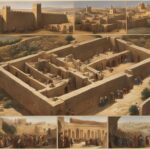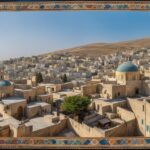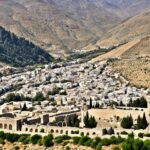Jerusalem, a city beloved by Jews, Christians, and Muslims, holds significant biblical roots. It is mentioned 667 times in the Old Testament and 139 times in the New. Although now a bustling city with over 770,000 people, Jerusalem’s humble origins trace back to the Hill Country of Judah, characterized by a treacherous landscape that guarded its access.
Key Takeaways:
- Jerusalem is mentioned over 800 times in the Bible, indicating its scriptural importance and spiritual significance.
- The city’s origins were humble, starting as a settlement in the southern portion of the eastern ridge.
- Jerusalem played a vital role in the lives of Abraham, King David, and Solomon, with significant biblical events taking place within its walls.
- Today, Jerusalem continues to captivate believers and scholars, serving as a symbol of faith, unity, division, and the hope of God’s promised redemption.
- Exploring the biblical roots of Jerusalem provides invaluable insights into its historical, cultural, and theological significance.
Historical Significance of Jerusalem in the Bible
Jerusalem holds a rich and profound historical significance in the Bible. It is mentioned numerous times throughout biblical texts, highlighting its central role in the narrative. From its humble origins as a small settlement, Jerusalem grew to become the capital city under the reign of King David, solidifying its status as the spiritual and political center for the Israelites.
One of the most notable features of Jerusalem’s historical significance is its association with Solomon’s temple, which stood as a symbol of worship and divine presence. The temple was an essential site for religious rituals and ceremonies, attracting worshippers from far and wide.
Throughout its history, Jerusalem witnessed significant events that shaped biblical history. It was the location where Abraham encountered Melchizedek, a meeting that held deep spiritual implications. Jerusalem also played a crucial role in Joshua’s conquest of Canaan and later became the capital city under King David’s reign.
“Jerusalem, the city of great kings, has a long and storied history. Its significance in biblical events cannot be overstated, and its role extends far beyond a mere physical location. Jerusalem is a testament to the enduring presence of God and the spiritual legacy it carries.”– Biblical Historian
Despite its rich history, Jerusalem faced numerous challenges, including attacks and destruction. The Babylonian invasion and subsequent exile brought immense suffering upon the city, yet it endured and rebuilt itself time and time again.
What makes Jerusalem’s historical significance truly remarkable is its lasting impact as a spiritual and cultural epicenter for the three major monotheistic religions. Judaism, Christianity, and Islam all consider Jerusalem as a sacred city and hold it in reverence, further enhancing its historical importance.
As a diverse and multicultural city, Jerusalem continues to attract visitors from all walks of life who seek to explore its biblical roots and experience its profound historical significance. Its timeless importance and enduring legacy make Jerusalem a testimony to the enduring power of faith and the human spirit.
| Key Points | Details |
|---|---|
| Origin of Jerusalem in the Bible | Jerusalem’s early origins as a humble settlement and its subsequent growth under King David’s leadership |
| Significance of Jerusalem in Ancient Times | Jerusalem’s role as the spiritual and political center for the Israelites, and its association with Solomon’s temple |
| Biblical Events in Jerusalem | Encounters between Abraham and Melchizedek, Joshua’s conquest, and King David’s reign |
| Challenges and Destruction | Babylonian invasion and subsequent exile that tested Jerusalem’s resilience |
| Multireligious Significance | Jerusalem’s importance in Judaism, Christianity, and Islam, strengthening its historical and spiritual significance |
Geographical Location of Jerusalem in the Bible
In the biblical narrative, Jerusalem is situated in the Hill Country of Judah, characterized by its unique topography and landscape. The city is located on two parallel north-south ridges, offering a commanding view of its surroundings. The higher and broader western ridge of Jerusalem is bounded by the Hinnom Valley, while the narrower and lower eastern ridge is bounded by the Kidron Valley. This geographical configuration created a rugged and treacherous terrain that provided natural protection for the city, making it difficult for enemies to attack.
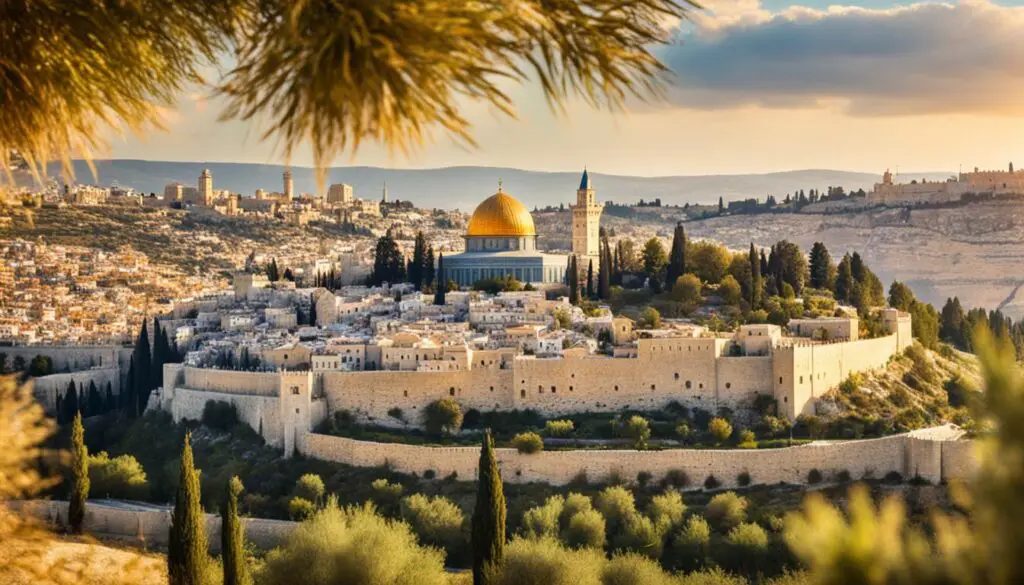
The Hill Country of Judah, where Jerusalem is situated, is a region characterized by its hilly landscape and rocky terrain. The city’s location within this region gave it strategic importance, as it was less vulnerable to outside influences and invasions. Additionally, the Hill Country of Judah provided ample natural resources, including water sources such as the Gihon Spring, which played a crucial role in sustaining the city.
The geographical location of Jerusalem also contributed to its development as the capital city under King David. Its position within the Hill Country of Judah allowed for easy defense and control over the surrounding areas. The city’s elevated position and natural barriers made it an ideal stronghold and a symbol of power and authority.
Archaeological Discoveries in Jerusalem
Excavations in Jerusalem have revealed a wealth of archaeological discoveries that shed light on its biblical history. These findings provide important insights into the lives of ancient Jerusalem’s inhabitants and help corroborate the accounts found in the Bible.
Among the notable discoveries are ancient walls from different time periods, including a thick wall dating back to around 1800 BC. This fortified wall continued to be used until the end of the Judean monarchy, illustrating the enduring significance of Jerusalem even in ancient times.
Another remarkable find is the Gihon Spring, an underground tunnel constructed by Hezekiah in the 8th century BC. This feat of engineering was designed to divert water from the Gihon Spring into the city, ensuring a reliable water supply even during times of siege.
“The archaeological excavations have revealed a tantalizing glimpse into the daily life and cultural practices of the people who called ancient Jerusalem home.”
The remains of Solomon’s temple, one of the most sacred sites in Judaism, have also been unearthed. These archaeological findings provide valuable evidence of the temple’s existence and offer valuable insights into the religious practices of the time.
By studying these ancient artifacts and structures, archaeologists can piece together a more complete picture of life in ancient Jerusalem. These discoveries lend credibility to the biblical accounts and deepen our understanding of the city’s rich history.
The Gihon Spring: A Testament to Ancient Engineering
The Gihon Spring is one of the most significant discoveries in Jerusalem. The underground tunnel constructed by Hezekiah showcases the ingenuity and engineering prowess of the ancient inhabitants of the city.
Stretching over 500 meters, the tunnel connects the Gihon Spring to the Pool of Siloam within the city walls. The tunnel not only provided a reliable water source for the inhabitants but also served as a testament to Jerusalem’s strength and resilience. Through the careful study of this remarkable feat, archaeologists gain valuable insights into the technical capabilities and resourcefulness of ancient Jerusalem.
| Archaeological Discoveries in Jerusalem |
|---|
| Ancient walls dating back to 1800 BC |
| The Gihon Spring and Hezekiah’s tunnel |
| Remains of Solomon’s temple |
These archaeological discoveries not only bring ancient Jerusalem to life but also strengthen the historicity of the Bible. By studying the physical remnants of the past, we gain a deeper appreciation for the rich and vibrant history of this sacred city.
Theological Themes in Jerusalem in the Bible
Jerusalem is not only a physical place but also a powerful theological symbol in the Bible. It represents the spiritual center for the Israelites and holds deep spiritual significance for believers. The city is associated with various theological themes that reflect its profound spiritual legacy.
Divine Presence and Covenant
In the Bible, Jerusalem is seen as the dwelling place of God. It is the location where God chooses to reveal Himself to His people and establish His presence. The temple in Jerusalem served as a holy sanctuary where God’s glory resided. Jerusalem also symbolizes the divine covenant between God and the Israelites, representing the special relationship and promises God made to His chosen people.
Redemption and Salvation
“For out of Zion shall go forth the law, and the word of the Lord from Jerusalem.” – Isaiah 2:3
Jerusalem is associated with redemption and salvation in the Bible. It serves as a metaphorical representation of the ultimate fulfillment of God’s promises and the restoration of all things. The biblical prophecies regarding Jerusalem emphasize a future time of peace and righteousness where God’s kingdom will be established, bringing about the redemption and salvation of His people.
Peace and Unity
Jerusalem is often referred to as the city of peace, symbolizing the unity and harmony that God desires for His creation. It is envisioned as a place where people from all nations will gather together to worship God and live in peace. The biblical teachings underscore the importance of peace and unity among believers, and Jerusalem serves as a powerful reminder of this divine ideal.
Biblical Symbolism
Jerusalem is rich in biblical symbolism, representing spiritual truths and concepts. It symbolizes the heavenly Jerusalem, the eternal city of God. It also represents faith, hope, and righteousness, showcasing the transformative power of God’s grace and the call to live a life pleasing to Him. The various biblical narratives and teachings associated with Jerusalem highlight the significance of these theological themes.
Overall, Jerusalem holds a special place in the Bible as a theological symbol. Its spiritual significance, divine presence, and representation of redemption and unity make it a profound and inspiring city for believers.
Key Biblical Events in Jerusalem
Jerusalem, a city steeped in biblical history, witnessed several key events that played a significant role in shaping the course of Israelite history. These pivotal moments in Jerusalem’s timeline hold immense religious and cultural importance, with lasting significance for believers today.
The Conquest Under Joshua
One of the first major events in Jerusalem’s biblical history was the conquest led by Joshua. The Israelites, under Joshua’s leadership, captured the city of Jerusalem and claimed it as part of their Promised Land. This conquest marked a crucial step in the establishment of Israelite rule in the region and set the stage for Jerusalem’s future significance.
King David’s Capture of Jerusalem
Another pivotal moment occurred when King David successfully conquered Jerusalem, making it his capital city. David’s capture of Jerusalem cemented its status as the political and spiritual center of the Israelites. His reign brought stability and prosperity to the city, laying the foundation for its future as a cultural and religious epicenter.
The Construction of Solomon’s Temple
Perhaps one of the most iconic events in Jerusalem’s biblical history was the construction of Solomon’s temple. This grand temple, built by King Solomon, became the central place of worship for the Israelites. It housed the Ark of the Covenant and served as a symbol of God’s presence among His people. The construction of Solomon’s temple solidified Jerusalem’s status as a holy city of great spiritual significance.
Jesus’ Crucifixion and Resurrection
Jerusalem also played a pivotal role in the life of Jesus Christ. The city witnessed significant events during the final days of Jesus’ earthly ministry, including his triumphal entry, the Last Supper, his crucifixion at Golgotha, and his resurrection. These events hold deep theological and spiritual significance for Christians worldwide, as they represent the ultimate sacrifice and victory over sin and death.
Abraham’s Encounter with Melchizedek
Another key biblical event in Jerusalem’s history was Abraham’s encounter with Melchizedek, the king of Salem. This encounter is significant as it highlights Jerusalem’s early importance and spiritual significance even before the Israelites’ arrival in the Promised Land. It foreshadows the city’s future role as a place of encounter and worship with the divine.
“Jerusalem witnessed several key biblical events that shaped the course of Israelite history, including the conquest under Joshua, King David’s capture of the city, the construction of Solomon’s temple, Jesus’ crucifixion and resurrection, and Abraham’s encounter with Melchizedek. These events played a vital role in Jerusalem’s religious and cultural development, weaving a rich tapestry of faith and history.”
These key biblical events in Jerusalem continue to hold profound significance for believers today. They serve as reminders of God’s providence, faithfulness, and redemptive plan throughout history. Jerusalem stands as a physical and spiritual testament to the enduring legacy of these events, drawing pilgrims and believers from around the world to experience the sacredness of this remarkable city.
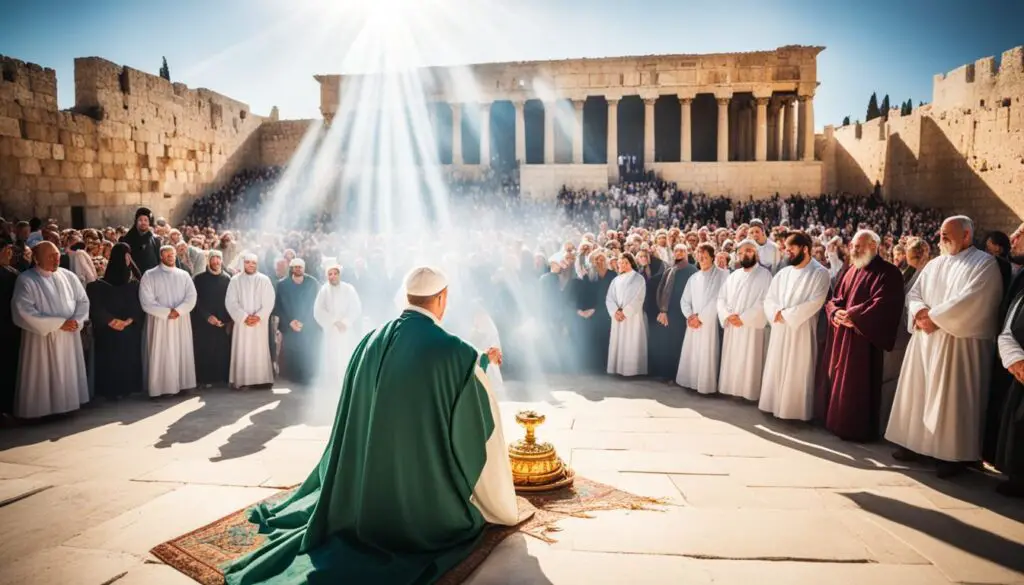
Cultural and Religious Practices in Jerusalem
Jerusalem, the ancient city known for its political and religious significance, was also a thriving hub of cultural activity. Throughout history, Jerusalem has been revered for its artistic expressions, vibrant music, and captivating festivals. The city’s cultural practices were deeply intertwined with its religious traditions, forming a unique tapestry of customs and rituals that defined Jerusalem’s identity.
Worship in Jerusalem revolved around the temple rituals that took place within the sacred walls. These rituals included solemn sacrifices, meaningful offerings, and awe-inspiring pilgrimages. The temple served as the spiritual center where people from all walks of life would gather to seek divine guidance, offer their homage, and experience a profound connection with the divine.
These cultural and religious practices were not transient, but rather, they were cherished traditions that were passed down from generation to generation. They formed an integral part of the fabric of Jerusalem’s society, strengthening the bond between its people and their collective faith.
“Jerusalem, a city steeped in rich cultural and religious practices, stood as a testament to the enduring legacy of faith and devotion. Its rituals and traditions, handed down through generations, served as a unifying force and a source of spiritual nourishment for its inhabitants.”
Today, Jerusalem continues to be a place where cultural and religious traditions are observed and celebrated. Pilgrims flock to the city to participate in ancient rituals, to experience the powerful connection between past and present, and to honor the deep-rooted spiritual heritage of Jerusalem.
Temple Rituals in Jerusalem
| Ritual | Description |
|---|---|
| Sacrifices | Animals were offered as sacrifices to express gratitude, seek forgiveness, or atone for sins. |
| Offerings | Various offerings, such as incense, bread, and wine, were presented as symbols of devotion and thanksgiving. |
| Pilgrimages | Pilgrims journeyed to Jerusalem from far and wide to offer their prayers and connect with the divine presence in the temple. |
The temple rituals in Jerusalem played a vital role in the spiritual lives of the people, fostering a sense of community, reverence, and awe. They provided a tangible means of expressing devotion and seeking divine favor, creating a profound and transformative worship experience.
Prophetic and Eschatological Significance of Jerusalem
Jerusalem holds a profound prophetic significance in the Bible, with numerous biblical prophecies detailing its future events and developments. These prophecies offer insights into the restoration of Jerusalem, the establishment of God’s kingdom, and the return of the Messiah.
One of the significant prophecies regarding Jerusalem is the restoration of the city. In various biblical passages, it is foretold that Jerusalem will be rebuilt, and its glory will be restored. This restoration signifies the renewal and redemption of the city and its people, reflecting God’s faithfulness to His promises.
Another prominent prophecy relates to the establishment of a righteous kingdom in Jerusalem. According to biblical prophecies, Jerusalem will become the seat of God’s governance and the center of His divine rule. It will be a place where justice, righteousness, and peace prevail, ushering in an era of spiritual and societal transformation.
Furthermore, Jerusalem is believed to be the focal point of eschatological events, marking the culmination of God’s plan for humanity. It is associated with the end times and the ultimate fulfillment of biblical prophecies. The return of the Messiah and the final judgment are anticipated to take place in Jerusalem, reflecting its pivotal role in the eschatological narrative.
“And I saw the holy city, new Jerusalem, coming down out of heaven from God, prepared as a bride adorned for her husband.” – Revelation 21:2
The prophetic and eschatological significance of Jerusalem continues to captivate scholars and believers, inspiring them to study and interpret these prophecies in the context of their faith. These prophecies provide hope, assurance, and a glimpse into God’s divine plan for the future.
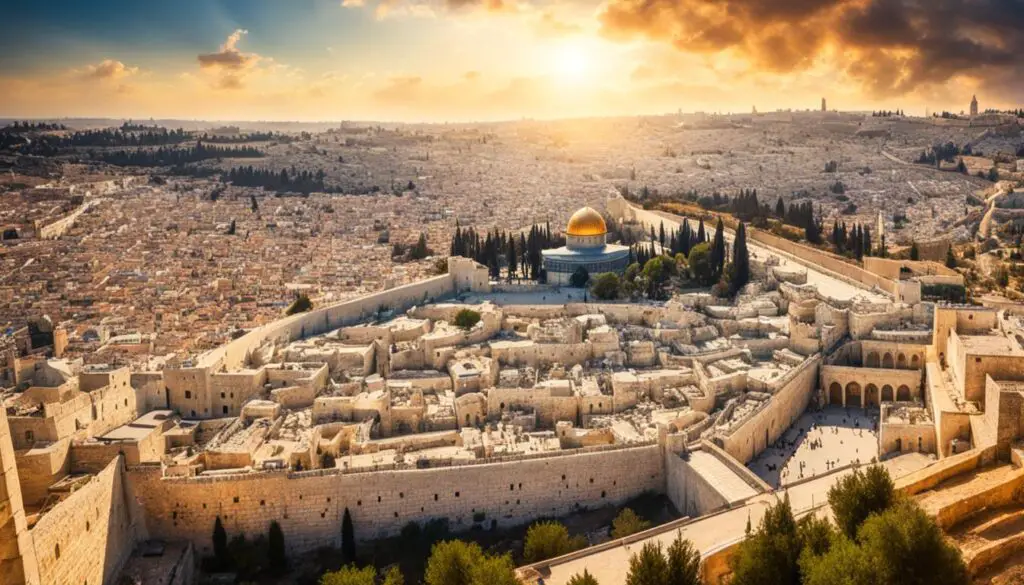
The Restoration of Jerusalem
According to biblical prophecies, Jerusalem will experience a restoration, both physically and spiritually. The city will be rebuilt, reflecting God’s faithfulness and the fulfillment of His promises. This restoration signifies a renewed purpose and destiny for Jerusalem, with its glory and significance reinstated.
The Establishment of God’s Kingdom
Jerusalem holds a central role in the establishment of God’s kingdom on Earth. Biblical prophecies describe a future where Jerusalem becomes the seat of divine governance, where justice, righteousness, and peace prevail. The establishment of God’s kingdom in Jerusalem represents a transformative era of spiritual and societal renewal.
Jerusalem in the End Times
Jerusalem’s significance extends to the end times, playing a vital role in the eschatological narrative. It is believed to be the focal point of significant events, including the return of the Messiah and the final judgment. As the stage for these climactic events, Jerusalem holds great prophetic and eschatological significance in the biblical context.
Jerusalem in the Bible: A Symbol of Unity and Division
Jerusalem has a complex and dynamic history, characterized by both unity and division. It holds significant religious importance for Jews, Christians, and Muslims, making it a place of religious coexistence and pilgrimage. However, Jerusalem has also been a site of conflicts and divisions, stemming from its religious significance and geopolitical tensions.
Throughout history, Jerusalem has experienced numerous conquests, changes in rulership, and disputes over control. These conflicts have often led to the division of the city, with different religious and ethnic groups vying for influence and control. The divided nature of Jerusalem serves as a symbol of the multifaceted relationships between these groups and the challenges they face in coexisting peacefully.
In spite of the divisions, Jerusalem remains a place where people of diverse faiths come together to worship and express their religious devotion. This rich tapestry of religious coexistence is a testament to the enduring power of Jerusalem to serve as a unifying force, even amidst the challenges that arise.
Religious Conflicts and Coexistence in Jerusalem
The religious conflicts in Jerusalem have often centered around the holy sites that hold significance for multiple faiths. The most notable example is the Temple Mount, which is sacred to Jews, Christians, and Muslims. The conflicts over access and control of this site have fueled tensions and led to violent clashes throughout history.
Despite these conflicts, there are also instances of religious coexistence and mutual respect in Jerusalem. The Old City, with its diverse array of religious sites, serves as a tangible symbol of the city’s ability to accommodate different faiths. People from all over the world visit Jerusalem to worship, pray, and immerse themselves in the rich religious traditions present within its walls.
Religious leaders and organizations in Jerusalem have played a crucial role in facilitating interfaith dialogue and promoting peaceful coexistence. Their efforts, along with the resilience and determination of the people of Jerusalem, contribute to maintaining a delicate balance between unity and division within the city.
Jerusalem as a Divided City
The division of Jerusalem is not only a result of religious conflicts but also geopolitical factors. The city has been divided and controlled by different powers throughout history, leading to physical barriers and separations between communities.
One of the most significant divisions in Jerusalem occurred in 1948, when the city was split between Israel and Jordan as a result of the Arab-Israeli conflict. This division lasted until 1967 when Israel gained control over East Jerusalem during the Six-Day War. However, the status of Jerusalem remains a contentious issue, with conflicting claims and aspirations from both Israelis and Palestinians.
The physical division of Jerusalem has had profound impacts on the daily lives of its residents, as well as on the social, economic, and cultural dynamics of the city. Efforts to bridge the gaps and find a path towards unity and shared governance continue to be a pressing challenge for all those invested in the future of Jerusalem.
Quote:
“Jerusalem’s history is a testament to the complexities of religious coexistence and the challenges of maintaining unity in a divided city.” – Religious Scholar
A Vision for Unity
Despite the challenges and divisions, there are individuals, organizations, and initiatives working towards unity in Jerusalem. They recognize the importance of fostering dialogue, understanding, and cooperation among different religious and ethnic communities.
This vision for unity involves promoting respect for all faiths, promoting education and awareness about the shared history and heritage of Jerusalem, and creating spaces and opportunities for meaningful interfaith interactions. Through these efforts, the hope is to overcome the divisions and transform Jerusalem into a symbol of unity and harmony.
Religious Sites in Jerusalem
| Religion | Main Holy Sites |
|---|---|
| Judaism | Western Wall, Temple Mount |
| Christianity | Church of the Holy Sepulchre, Mount Zion |
| Islam | Al-Aqsa Mosque, Dome of the Rock |
These religious sites, among many others, represent the diverse and intertwined religious heritage of Jerusalem. They serve as reminders of the common spiritual aspirations and the possibilities for unity within the city.
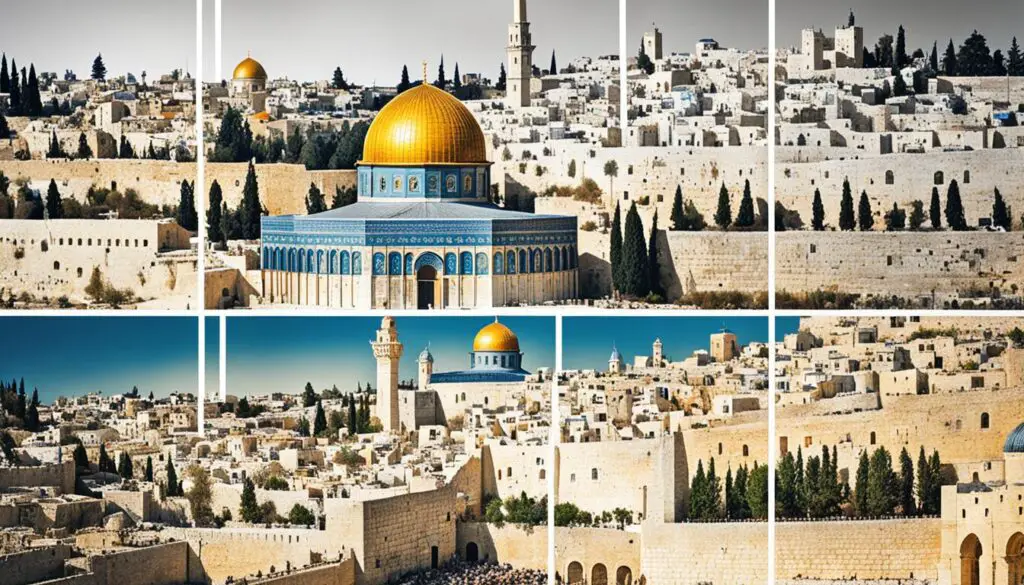
Despite the challenges and complexities, Jerusalem remains a city of immense religious significance, embodying both unity and division. Its ability to accommodate diverse faiths and inspire devotion is a testament to the resilience and faith of its inhabitants. As efforts toward dialogue and unity continue, Jerusalem has the potential to become a symbol of peaceful coexistence and shared spirituality.
The Enduring Significance of Jerusalem in the Bible
Despite its humble origins and tumultuous history, Jerusalem holds an enduring significance in the Bible. It remains a holy city, revered by believers from various religious backgrounds, as a place of pilgrimage, worship, and spiritual growth. The timeless importance of Jerusalem goes beyond its physical and geopolitical aspects, encompassing a spiritual legacy that resonates with faith, hope, and the fulfillment of God’s promises.
Jerusalem’s enduring significance is seen in the profound impact it has on the lives of millions of believers. Through holy sites, historical landmarks, and personal experiences, Jerusalem serves as a powerful reminder of the enduring faith and spiritual journey of individuals and communities.
“Jerusalem is a city that has witnessed countless prayers, tears, and moments of divine encounter. Its hallowed streets continue to inspire believers, drawing them closer to their respective faiths and fostering a deep sense of connection to the divine.”
The enduring significance of Jerusalem is not limited to a single era or religious tradition. It transcends time and religious boundaries, serving as a symbol of unity and shared spiritual heritage. Jerusalem’s lasting impact is felt through the centuries, as it stands as a testament to the enduring power of faith and the unwavering devotion of believers.
Whether through the biblical accounts of key events, the profound theological themes associated with the city, or the ongoing pilgrimage and worship, Jerusalem’s enduring significance continues to shape the beliefs, values, and practices of millions around the world.
Historical Sites in Jerusalem with Enduring Spiritual Significance
| Site | Description |
|---|---|
| Western Wall | The Western Wall, also known as the Wailing Wall, is a sacred site for Jews, who gather to pray and leave notes in the wall’s crevices as a form of communication with God. |
| Church of the Holy Sepulchre | The Church of the Holy Sepulchre is believed to be the site of Jesus’ crucifixion, burial, and resurrection. It is a significant place of pilgrimage for Christians. |
| Dome of the Rock | The Dome of the Rock is an iconic Islamic shrine that holds religious and historical significance for Muslims. It is located on the Temple Mount, where the biblical Solomon’s Temple once stood. |
These and other historical sites in Jerusalem carry a timeless spiritual legacy, drawing believers from different faiths to seek solace, inspiration, and a deepened connection to their respective religions.
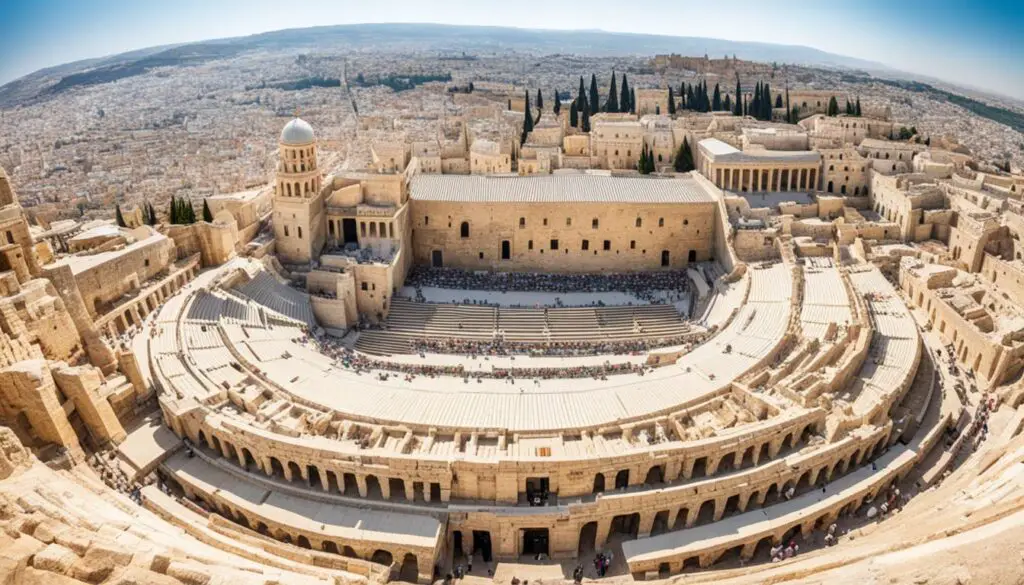
Conclusion
Jerusalem in the Bible holds a significant place in history, culture, and spirituality. This sacred city is mentioned numerous times throughout the Old and New Testaments, emphasizing its central role in the biblical narrative. With its biblical origins, prophetic significance, and enduring legacy, Jerusalem continues to captivate believers and scholars alike.
Archaeological discoveries in Jerusalem have shed light on its rich history and validated biblical accounts. The city’s theological themes symbolize God’s presence, covenant, and the ultimate fulfillment of His promises. Key biblical events, such as Abraham’s encounter with Melchizedek and the construction of Solomon’s temple, have shaped Jerusalem’s religious and cultural development.
While Jerusalem has been a symbol of unity for believers from different religious backgrounds, it has also experienced division and conflicts due to its religious and geopolitical significance. However, its enduring significance transcends physical boundaries and serves as a timeless reminder of faith, hope, and the promise of redemption.
In conclusion, Jerusalem’s scriptural importance and spiritual significance continue to inspire and resonate with people around the world. This sacred city encapsulates the essence of the biblical narrative, offering a glimpse into history, faith, and the hope of a future filled with God’s divine plan.


